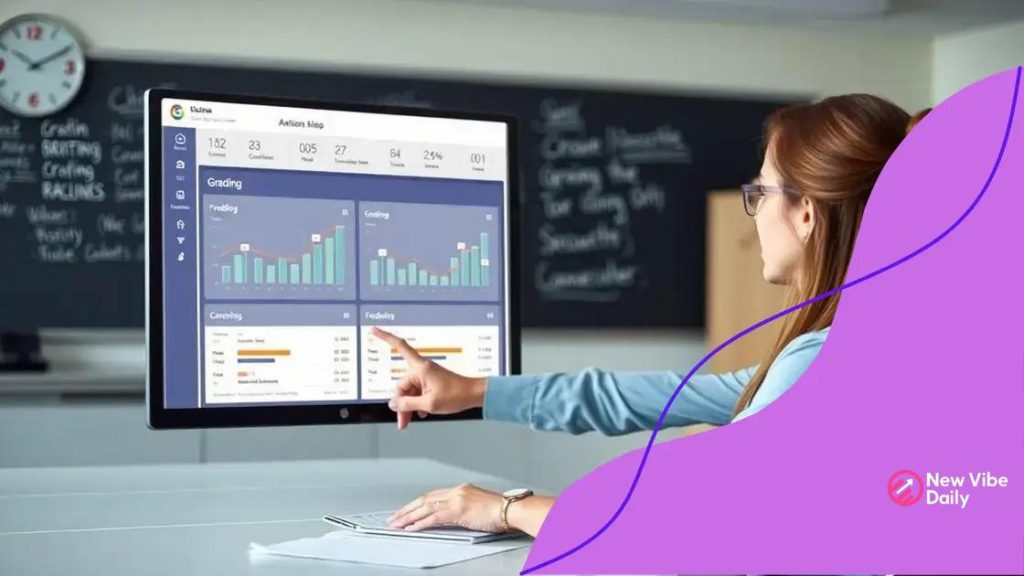The role of artificial intelligence in grading and feedback

The role of artificial intelligence in grading and feedback significantly enhances educational assessments by providing personalized learning experiences, real-time feedback, and efficient analysis of student performance.
The role of artificial intelligence in grading and feedback is reshaping the educational landscape. Imagine receiving tailored feedback with minimal wait time! Let’s explore how this technology enhances learning.
Understanding the basics of AI in education
Understanding the basics of AI in education allows educators and students to appreciate its potential benefits. This technology is rapidly changing how we approach learning and assessment. From automated grading to personalized feedback, AI plays a crucial role in enhancing the educational experience.
What is AI?
Artificial Intelligence, commonly referred to as AI, is a branch of computer science focused on creating systems that can perform tasks typically requiring human intelligence. These tasks include recognizing speech, making decisions, and learning from experience.
How AI Works in Education
AI systems analyze large amounts of data to identify patterns. In education, this means analyzing student performance and adapting to their individual needs. For example, AI can track grades and provide insights into areas where students are struggling.
- Real-time feedback helps students improve faster.
- Automated systems reduce grading time for teachers.
- Personalized learning paths cater to various learning styles.
Moreover, AI tools can support teachers by automating administrative tasks. This allows educators to focus more on teaching rather than getting lost in paperwork. As AI becomes more integrated into educational systems, its role continues to expand.
Understanding the basics of AI in education is essential for both teachers and students. This transformative technology can enhance learning outcomes and streamline classroom management. By embracing AI, education can become more accessible and effective for everyone.
How AI improves grading accuracy
How AI improves grading accuracy is a critical question in the world of education today. By utilizing advanced algorithms, AI can analyze student work far more efficiently than traditional methods. This technology ensures that assessments are not only faster but also more objective.
The Role of Data in Grading
AI systems leverage data to enhance grading accuracy. They collect information from various student assignments and exams. This data is then analyzed to create benchmarks, allowing for consistent grading standards.
- Automated grading reduces human error.
- AI can compare student submissions with a database of correct responses.
- Feedback is generated based on ongoing analysis of student performance.
Additionally, AI tools can identify patterns in grading. For instance, if multiple students struggle with a specific question, the system can point this out to educators. This not only helps improve grading accuracy but also highlights areas where students may need additional support.
One significant advantage of AI in grading is its ability to provide instant results. Students no longer have to wait days for feedback. With AI, they receive immediate insights into their strengths and weaknesses, fostering a more engaging learning process. Furthermore, immediate feedback promotes a growth mindset, encouraging continual improvement.
Incorporating AI in education not only leads to better grading but also sharpens the overall assessment process. Teachers can spend less time on grading and more time focusing on student engagement and personalized teaching strategies.
Personalized feedback through AI technologies

Personalized feedback through AI technologies is transforming how students learn. Instead of a one-size-fits-all approach, AI systems analyze each student’s unique performance and needs. This allows for tailored suggestions and insights that enhance educational outcomes.
How AI Generates Feedback
AI technologies utilize data from various assessments to provide personalized recommendations. By evaluating students’ strengths and weaknesses, these systems can highlight areas for improvement. For example, if a student struggles with math concepts, the AI can provide specific exercises to help.
- Feedback is immediate and actionable.
- Students receive insights on their learning progress.
- Teachers can better understand group performance.
This targeted feedback is vital in fostering a growth mindset. When students see feedback tailored to them, they feel more motivated to improve. Through AI, learners can progress at their speed, making the educational journey more individualized.
Moreover, AI technologies help educators by automating the feedback process. This means less time spent grading and more time focused on engaging with students. Teachers can utilize the insights generated by AI to modify their lessons and better meet students’ needs.
Overall, personalized feedback through AI technologies not only benefits students but also educators. It creates an environment where learning can truly be customized, making education more effective and enjoyable.
Challenges of implementing AI in classrooms
Implementing AI in classrooms brings a set of challenges that educators and institutions must address. While the benefits are clear, these hurdles can seem daunting. Understanding these challenges is essential for a smooth transition to AI-enhanced education.
Resistance to Change
One of the primary challenges is resistance to change. Many educators are accustomed to traditional teaching methods. Some may fear that AI could replace their roles or disrupt established classroom dynamics. This resistance often stems from a lack of understanding of how AI can enhance, rather than replace, their teaching.
Data Privacy Concerns
Another significant issue involves data privacy. With AI systems collecting and analyzing student data, concerns about confidentiality and security arise. Schools must ensure that any technology used complies with privacy regulations, protecting students’ personal information.
- Establishing clear data management policies is crucial.
- Training staff on data privacy is essential.
- Involving parents and students in discussions enhances trust.
Additionally, the cost of implementing AI technologies can pose a barrier. Budget constraints may limit schools’ ability to invest in the necessary tools and training. Finding funding sources or grants can be challenging, but it is vital for effective integration.
Lastly, limited training for educators on how to use AI effectively can hinder its potential benefits. Educators need proper professional development to feel comfortable with technology in their classrooms. Providing ongoing support and resources will help them maximize AI‘s advantages.
Future trends of AI in assessment
The future trends of AI in assessment are exciting and full of potential. As technology advances, we can expect to see more sophisticated AI tools that enhance the learning experience. These tools will automate and improve the assessment process significantly.
Increased Personalization
One major trend is the movement towards increased personalization in assessments. AI can analyze a student’s performance over time and adapt assessments to fit their individual learning styles. This means that each assessment can become more relevant and effective for each student.
Real-Time Feedback
Another significant trend is the ability to provide real-time feedback. AI systems will analyze student responses during assessments and offer immediate suggestions or corrections. This instant feedback can help students understand their mistakes and learn from them right away, promoting a more engaging learning process.
- Students can track their progress over time.
- Feedback can be customized based on individual performance.
- Teachers can receive insights to adjust their teaching strategies.
Furthermore, AI will enhance the ability to assess soft skills. Traditional assessments often focus on hard skills, leaving out crucial competencies like teamwork and problem-solving. Using AI, schools can create scenarios and simulations to evaluate these skills effectively.
As AI technologies become more integrated into classrooms, we will also see the rise of adaptive assessments. These assessments will change in difficulty based on the student’s answers in real-time, providing a more accurate measure of their capabilities.
Ultimately, the future of AI in assessment holds the promise of a more efficient, effective, and personalized educational experience, benefiting both students and educators alike.
FAQ – Frequently Asked Questions about AI in Education
How does AI personalize learning for students?
AI analyzes individual student performance and adapts assessments to fit their unique learning styles, making education more relevant and effective.
What is the role of real-time feedback in AI assessments?
Real-time feedback allows students to receive immediate insights into their work, helping them understand mistakes and improve their learning process on the spot.
Can AI assess soft skills in students?
Yes, AI technology can evaluate soft skills like teamwork and problem-solving through simulations and interactive scenarios.
What challenges do schools face when implementing AI?
Challenges include resistance to change, data privacy concerns, costs of technology, and the need for proper training for educators.






